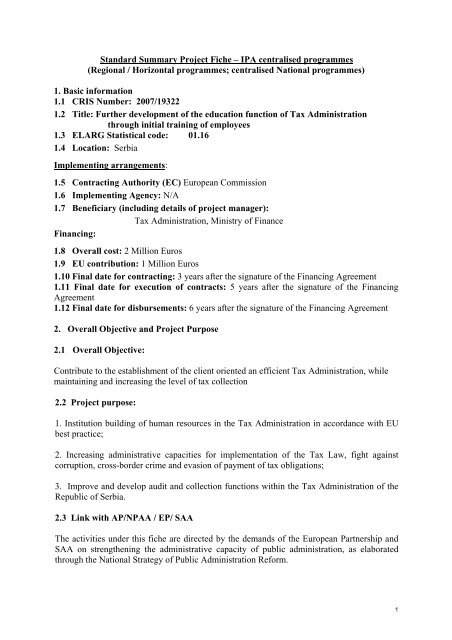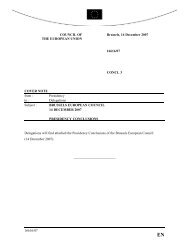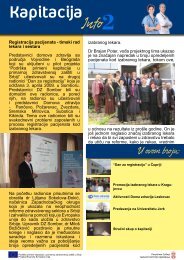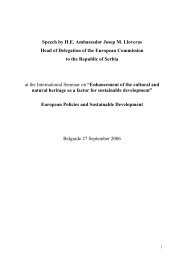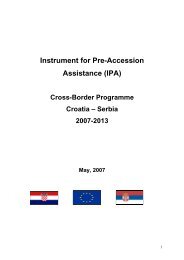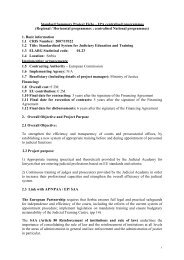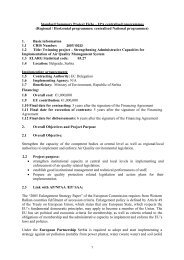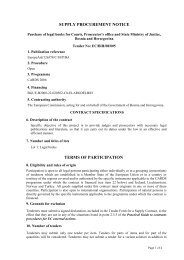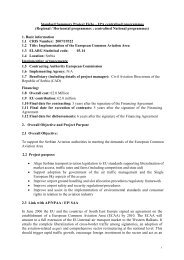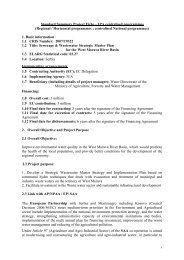Tax Administration - European Commission
Tax Administration - European Commission
Tax Administration - European Commission
You also want an ePaper? Increase the reach of your titles
YUMPU automatically turns print PDFs into web optimized ePapers that Google loves.
Standard Summary Project Fiche – IPA centralised programmes<br />
(Regional / Horizontal programmes; centralised National programmes)<br />
1. Basic information<br />
1.1 CRIS Number: 2007/19322<br />
1.2 Title: Further development of the education function of <strong>Tax</strong> <strong>Administration</strong><br />
through initial training of employees<br />
1.3 ELARG Statistical code: 01.16<br />
1.4 Location: Serbia<br />
Implementing arrangements:<br />
1.5 Contracting Authority (EC) <strong>European</strong> <strong>Commission</strong><br />
1.6 Implementing Agency: N/A<br />
1.7 Beneficiary (including details of project manager):<br />
<strong>Tax</strong> <strong>Administration</strong>, Ministry of Finance<br />
Financing:<br />
1.8 Overall cost: 2 Million Euros<br />
1.9 EU contribution: 1 Million Euros<br />
1.10 Final date for contracting: 3 years after the signature of the Financing Agreement<br />
1.11 Final date for execution of contracts: 5 years after the signature of the Financing<br />
Agreement<br />
1.12 Final date for disbursements: 6 years after the signature of the Financing Agreement<br />
2. Overall Objective and Project Purpose<br />
2.1 Overall Objective:<br />
Contribute to the establishment of the client oriented an efficient <strong>Tax</strong> <strong>Administration</strong>, while<br />
maintaining and increasing the level of tax collection<br />
2.2 Project purpose:<br />
1. Institution building of human resources in the <strong>Tax</strong> <strong>Administration</strong> in accordance with EU<br />
best practice;<br />
2. Increasing administrative capacities for implementation of the <strong>Tax</strong> Law, fight against<br />
corruption, cross-border crime and evasion of payment of tax obligations;<br />
3. Improve and develop audit and collection functions within the <strong>Tax</strong> <strong>Administration</strong> of the<br />
Republic of Serbia.<br />
2.3 Link with AP/NPAA / EP/ SAA<br />
The activities under this fiche are directed by the demands of the <strong>European</strong> Partnership and<br />
SAA on strengthening the administrative capacity of public administration, as elaborated<br />
through the National Strategy of Public <strong>Administration</strong> Reform.<br />
1
2.4 Link with MIPD<br />
The MIPD lists the following as possible areas of intervention in the field of Public<br />
<strong>Administration</strong> reform: “Improving budget and fiscal management, enhancing control and<br />
collection capacity of the tax and customs administration, contribute to consolidating revenue<br />
collection for Serbia’s consolidated budget, make tax policy coherent at central and local<br />
levels and improve the management of expenditures.” (section 2.2.1.1., pages 15-16)<br />
2.5 Link with National Development Plan (where applicable)<br />
N/A<br />
2.6 Link with national/ sectoral investment plans(where applicable)<br />
N/A<br />
3. Description of project<br />
3.1 Background and justification:<br />
The Thessaloniki Agenda, which urges countries in the region to promote the principles of<br />
transparency, accountability and sound public sector management, provides the overall<br />
strategic direction for the proposed programme in the area of general public administration<br />
reform and reform of the public finance. This is consistent with the demands of the<br />
Copenhagen Criteria, which highlights the need for an efficient and well functioning civil<br />
service and the MIP objective of developing an accountable public administration in line with<br />
EU standards. The SAP underlines the need to address civil service pay system reforms and<br />
related human resource development measures while the Country Strategy Paper calls for<br />
creation of an independent and efficient civil service.<br />
This project proposal contains strategic direction contained in the <strong>European</strong> Partnership on<br />
strengthening of administrative capacity of public administration, elaborated through the<br />
national Strategy of Public <strong>Administration</strong> Reform. Naturally, principles of organization and<br />
functioning of public administration in EU Member States represent the main starting point<br />
and the ultimate goal the planned reform aims to achieve, so further development of education<br />
within the <strong>Tax</strong> <strong>Administration</strong> is founded on the <strong>European</strong> trend of improving the level of<br />
expertise and responsibility of the employees, starting with objective and unbiased criteria for<br />
selection of new employees based on capabilities, through permanent in-service improvement<br />
and creation of environment which is stimulating the employees’ motivation. All this is aimed<br />
at establishing the process of “knowledge management” in the <strong>Tax</strong> <strong>Administration</strong>.<br />
In the Annual Report on the Progress of the Republic of Serbia in 2006 on the Realization of<br />
Priorities Defined by the <strong>European</strong> Partnership, in item 4.1.4., related to customs and taxes, it<br />
was stated that administrative capacities in the <strong>Tax</strong> <strong>Administration</strong> are weak, especially those<br />
in charge of collection and audit of VAT and excise duties. This reality is mainly a<br />
consequence of misbalance between the number of employees in the basic functions of tax<br />
administration and great number of tax administration activities. These problems in the area<br />
of human resources are reflected in insufficient number of high-quality and trained personnel<br />
in the head Office of the <strong>Tax</strong> <strong>Administration</strong>, as well as in insufficient number of trained and<br />
capable personnel in the affiliates and branches of the <strong>Tax</strong> <strong>Administration</strong>.<br />
2
At present, current profiles of graduates from higher education institutions do not make it<br />
possible for direct inclusion of graduate economists and lawyers in performing administrative<br />
taxation functions. Therefore, there is a need for increased and improved training and<br />
instruction. The aim of this project is to provide efficient realization of the employment<br />
policy in the <strong>Tax</strong> <strong>Administration</strong>. The training must be highly specialized and organized as<br />
there is a need for shortening of the time necessary for training of the trainees for the jobs for<br />
assessing and collection of public revenues, having in mind the complexity of required<br />
knowledge and skills.<br />
The target category of newly employed has to be trained in required skills and knowledge<br />
related to the tax material and process law, so as to be able to be included in basic functions of<br />
audit and collection.<br />
This project will enable introduction of this category of employees into current business<br />
processes in a much shorter time, and secure systematically completed required expertise.<br />
Due to specific character of the necessary and required knowledge it is expected that, after 6<br />
months, the newly employed in the <strong>Tax</strong> <strong>Administration</strong> will, through receiving necessary<br />
information on the tax system and procedures in the Republic of Serbia, as well as through<br />
transfer of best practices of the <strong>European</strong> tax administrations, be qualified for independent<br />
execution of tasks. In effect, this project is addressing skill gaps in a key category of the tax<br />
administration system. The target group for training will be 120 staff members.<br />
During the initial training, the work of the participants shall be monitored by mentors in their<br />
organizational unit. After this time, participants will be qualified to work on their own. The<br />
process of organizing and realization of initial training is carried out every year, after the<br />
trainees have been employed. In this way, systematic upgrading of institutional capacities of<br />
the <strong>Tax</strong> <strong>Administration</strong> will be obtained.<br />
The <strong>Tax</strong> <strong>Administration</strong> office has its own premises for implementation of these activities, a<br />
number of lecturers and a clear concept of the subject and contents of the training. One of the<br />
strategic aims of <strong>Tax</strong> <strong>Administration</strong> of the Republic of Serbia is to have a client-oriented<br />
administration designed as per the <strong>European</strong> standards. Therefore, it is necessary, by engaging<br />
<strong>Tax</strong> and training experts both from EU countries and Serbia, to obtain exchange of the best<br />
practice in tax related training.<br />
3.2 Assessment of project impact, catalytic effect, sustainability and cross border impact<br />
(where applicable)<br />
National Strategy of Serbia for Accession to the EU, Action Plan for Implementation of<br />
Priorities from the <strong>European</strong> Partnership, as well as Strategy for the Reform of Public<br />
<strong>Administration</strong> in the Republic of Serbia, are the basic national documents defining further<br />
development in the area related to <strong>Tax</strong> <strong>Administration</strong> and its employees. Primary goals the<br />
Republic of Serbia tries to achieve by reforming public administration include building of a<br />
democratic state based on the rule of law, responsibility, transparency, cost-effectiveness and<br />
efficiency, as well as building of public administration focused towards the citizens, capable<br />
of rendering high level of services. The basic principles of the reform are:<br />
- Decentralization principle;<br />
- Depolitisation principle;<br />
- Professionalisation principle;<br />
3
- Rationalization principle;<br />
- Modernization principle.<br />
Professionalisation principle implies creation of a well-trained, responsible and efficient<br />
administration and is directly linked to the depolitisation principle. In order to fulfil this<br />
principle, it is necessary to secure permanent training of personnel during their entire service,<br />
with the possibility to provide the opportunity to get additional knowledge and skills, for<br />
example on the specific rights of civil servants.<br />
With regard to that, training and improvement of the employees aim at by-passing the<br />
differences between the current and the desired state of professional level of competence,<br />
together with continuous upgrading of the general level of administration and creation of<br />
conditions for the current position to be performed as efficiently as possible.<br />
Public <strong>Administration</strong> Reform ultimate goal is to provide Serbia with an “instrument” to<br />
make and implement policies and reforms and to provide public services to citizens.<br />
<strong>Tax</strong> <strong>Administration</strong> Reform in reinforcing its capacities and in ensuring tax collection<br />
contributes to the achievement of Public Finance Reforms in optimising the allocation of<br />
public resources, leading to economic development and reduction of poverty.<br />
In 2003 <strong>Tax</strong> <strong>Administration</strong> has introduced for the first time the Communication and Education<br />
Department. In 2005 and 2006 TA has introduced positions of full time training coordinators<br />
and trainers respectively.<br />
Furthermore, the four TA Training Centres have since 2004 hosted over 12.000 trainees and<br />
data on these trainings has been managed and processed through the TA Training Management<br />
Information System (TRMS).<br />
TA plans to, immediately after designing the Strategy for development of TA (planned for the<br />
end 2007), proceed to preparation of Strategy for Training of its employees, which would then<br />
determine the training budget for several years.<br />
3.3 Results and measurable indicators:<br />
Results and measurable indicators in relation with activity 1<br />
1. Prepared annual Training Plan and Programme<br />
2. Prepared and printed training material<br />
3. Prepared tests<br />
4. Trainers trained<br />
5. 120+ new tax personnel trained according to EU standards<br />
6. Prepared questionnaires for the evaluation<br />
7. Prepared Evaluation reports containing recommendations on redesign of training plan<br />
and materials<br />
8. Fully independent inclusion of training participants into the basic tax administration<br />
functions<br />
9. <strong>Tax</strong> inspectors qualified to independently and in a legally prescribed manner perform<br />
jobs from the competences of <strong>Tax</strong> <strong>Administration</strong>, fully respecting the taxpayers’<br />
rights.<br />
4
10. Recommendations established during evaluation of the project will be included in<br />
future Annual Training Plans.<br />
3.4 Activities:<br />
Activity 1<br />
• Sub-activity 1: Preparation of an Annual Training Plan and Programme for initial<br />
training, which shall have defined budget based on the expressed needs in the <strong>Tax</strong><br />
<strong>Administration</strong> as a whole. This Annual Training Plan and Programme shall serve as<br />
standard to be rolled out by the Training and Communication Department of TA. This<br />
activity can be further broken down in the following components:<br />
Preparation of needs assessment related to the training requirements in the<br />
field of initial training<br />
Definition of target groups within the <strong>Tax</strong> administration<br />
Definition if the training period<br />
Preparation of the training programme<br />
Preparation of the training plan<br />
• Sub-activity 2: Drawing up of training material and tests and preparation of a curriculum<br />
of topical training that shall be in accordance with the standards implemented by<br />
modern tax administrations in the field of training of new employees. The curriculum of<br />
topical training shall address the place and role of tax administration, review of the tax<br />
system of Serbia, dealing with material regulations for direct and indirect taxes (VAT<br />
Law, property tax, corporate income and personal income tax) with special focus on<br />
separate tax institutes, subject of taxation, taxpayer, rate, exemptions and incentives,<br />
dealing with procedural law (the Law on tax procedure and tax administration, Law on<br />
general administrative procedure, Law on administrative lawsuit) with special emphasis<br />
on taxpayers’ rights and obligations, the institute of desk and field audit and collection,<br />
measures and means of enforced collection, offences and tax crimes. Special focus<br />
would be put on elaboration of the Code of corporate taxation, by securing the best EU<br />
practice. This sub-activity shall consist of preparation of the following training modules<br />
and training material:<br />
Preparation of state administration system training module<br />
Preparation of tax system training module<br />
Preparation of taxation forms training module<br />
Preparation of tax procedures and <strong>Tax</strong> <strong>Administration</strong> Law training module<br />
(tax procedures, <strong>Tax</strong> <strong>Administration</strong> organisation, <strong>Tax</strong> <strong>Administration</strong><br />
responsibilities, <strong>Tax</strong> <strong>Administration</strong> functions, tax offences and tax crime)<br />
Preparation of administrative dispute training module<br />
Preparation of Ethics Code training module<br />
Preparation of Train the Trainer training module<br />
Preparation of set of tests on the complete curriculum<br />
• Sub-activity 3: Training implementation – which shall be carried out on three levels and<br />
in accordance with the schedule defined in the Annual Training Plan.<br />
Training of TA Trainers (TOT) – up to 20 trainers, shall be carried out in TA Education<br />
Centre in Belgrade. At TOT completion, the Pilot training shall be carried out in TA<br />
Education Centres.<br />
5
Finally, full-blown training shall be realized in the <strong>Tax</strong> <strong>Administration</strong>’s Education<br />
Centres in Belgrade, Novi Sad, Kragujevac and Niš (30 participants per group, i.e. 120<br />
participants per course). This sub-activity can be broken down in the following<br />
components:<br />
Training of trainers<br />
Pilot training<br />
Full blown training<br />
• Sub-activity 4: Evaluation of the training activities and results accompanied by<br />
recommendations and potential redesign of the training programme and material. This<br />
will include evaluation after receiving the course and after a period of 6 months. The<br />
sub-activity can be further broken down in the following components:<br />
Warm evaluation – after conclusion of each course, in accordance with the<br />
standards, evaluation of both the course and the lecturers is done;<br />
Cold evaluation – after a period of 6 months, the knowledge acquired during<br />
the training shall be checked in everyday work of the employees. This shall<br />
be done by using the set of evaluation questionnaires prepared under this<br />
project;<br />
Preparation of Evaluation report;<br />
Preparation of relevant recommendations in relation to conclusions of the<br />
Evaluation Report;<br />
Potential redesign of Training Programme, Training Plan and training<br />
material in relation to the recommendations from the above.<br />
This activity will be implemented by 1 institution building service contract of 1 Million<br />
Euros financed by EU, while National public contribution will cover trainee’s<br />
accommodation, per diems and other general training related running costs.<br />
3.5 Conditionality and sequencing:<br />
The success of the project largely depends on the <strong>Tax</strong> <strong>Administration</strong> commitment i.e. by<br />
timely provision of specialist staff, adequate office space and ensuring inter-department<br />
cooperation during its implementation. Also, it is necessary to continue activities on<br />
amendments of the Regulation on organisation and internal job classification in the <strong>Tax</strong><br />
<strong>Administration</strong>, in order to secure a critical mass of permanent lecturers. At the current level,<br />
with 4 permanent lecturers, realization of the project proposal would be directly undermined.<br />
There need to be adequate organisation, selection and (gender balanced) appointment of<br />
members of working groups, training sessions, seminars and study visits by the beneficiaries<br />
as per project work plan<br />
These conditions will be detailed in specific Memoranda of Understanding prior to the launch<br />
of project.<br />
6
3.6 Linked activities<br />
Since August 2002, through the <strong>European</strong> Agency for Reconstruction and other donors, EU<br />
has supported development of education within the project “Modernization of the <strong>Tax</strong><br />
<strong>Administration</strong> of the Republic of Serbia”, through:<br />
- Establishment of 4 <strong>Tax</strong> <strong>Administration</strong> Education Centres in Belgrade, Novi Sad,<br />
Kragujevac and Niš<br />
- Training of TA Training Coordinators in preparation of training material<br />
- Carrying out IT trainings<br />
- Training of trainers<br />
- Providing of software for management of education<br />
<strong>Tax</strong> <strong>Administration</strong> project proposal, development of initial training, would be a natural<br />
continuation of a part of the project “Modernization of <strong>Tax</strong> <strong>Administration</strong>”, because it would<br />
be a systematic completion of education function in the tax administration. This would<br />
maximize the effect of overall reform activities in this field.<br />
3.7 Lessons learned<br />
A recent EAR evaluation report of the EU’s tax administration programme pointed out that<br />
future programming should focus more on key institutional reforms rather than provision of<br />
equipment. The report also recommended that the Agency makes greater use of institutional<br />
assessments and implementation blueprints to minimize delays in start of implementation.<br />
These lessons further stress the need to focus support towards fundamental areas of public<br />
administration reform including civil service, human resource development (training, career<br />
development), policy making/inter-ministerial and donor coordination, budget process/budget<br />
implementation and public financial control. Assistance has to be tailored to the beneficiary’s<br />
absorption capacity.<br />
4. Indicative Budget (amounts in million €)<br />
SOURCES OF FUNDING<br />
TOTAL<br />
COST EU CONTRIBUTION NATIONAL PUBLIC CONTRIBUTION PRIVATE<br />
Activities Total % * IB INV Total % * Central Regional IFIs Total % *<br />
Activity 1<br />
contract 1.1 1.0 1.0 100 1 1 1<br />
contract 1.2<br />
Activity 2<br />
contract 2.1<br />
contract 2.2<br />
……<br />
TOTAL 1.0 1.0 100<br />
* expressed in % of the Total Cost<br />
7
5. Indicative Implementation Schedule (periods broken down per quarter)<br />
Contracts Start of Signature of Project<br />
Tendering contract Completion<br />
Contract 1.1 T+1Q T+2Q T+9Q<br />
All projects should in principle be ready for tendering in the 1 ST Quarter following the<br />
signature of the FA<br />
6. Cross cutting issues (where applicable)<br />
Development Policy Joint Statement by the Council and the <strong>European</strong> <strong>Commission</strong> of 10<br />
November 2000 establishes that a number of Cross-cutting Issues shall be mainstreamed into<br />
EC development co-operation and assistance.<br />
Cross-cutting issues will be addressed in the project so as to comply with the best EU<br />
standards and practice in that area and in a way which demonstrates how they will be dealt<br />
with within the project’s framework, its activities and outputs.<br />
Cross-cutting issues will be addressed in a proactive manner, and will present a specific<br />
component of projects (at all levels of projects' development, starting from the project<br />
identification stage). Synergies between the projects and the objectives of will be identified<br />
and developed. Also, the projects’ objectives and activities need to be screened in order to<br />
ensure they won’t impact negatively on gender equality, minorities’ inclusion and<br />
environment.<br />
Finally, the beneficiary will make sure its objectives, policies and interventions have a<br />
positive impact on and are in line with the main principles of gender equality, minorities’<br />
inclusion and environment.<br />
6.1 Equal Opportunity<br />
Training of tax administration staff, as part of the overall reform and modernisation of the<br />
civil service will aim at providing equal opportunities for women in terms of access to<br />
employment, promotion, equal wages, and social benefits. Equal treatment and opportunities<br />
for women should be realised through provisions that take into account the working capacities<br />
and family obligations. In particular, curricula and delivery mechanism (place and time<br />
schedule) of training programmes for civil servants should be thought of so as to favour<br />
women’s participation.<br />
6.2 Environment N/A<br />
6.3 Minorities<br />
As one of the aims of the project is to promote client oriented tax administration, the training<br />
could also include information on how to improve and ensure fair access to tax related<br />
services for men and women, ethnic minorities and people with special needs. Many<br />
vulnerable categories (Roma, IDPs, Refugees, etc.) do not have access to services they are<br />
entitled to due to a lack of information on rights/entitlements, inability to deal with<br />
application procedures, etc. (which, in turn, reflects and reinforces their stigma as marginal<br />
groups).<br />
8
ANNEX I: Logical framework matrix in standard format<br />
LOGFRAME PLANNING MATRIX FOR Project Fiche Programme name and number<br />
Further development of the education function of <strong>Tax</strong> <strong>Administration</strong> through initial training of<br />
employees<br />
Contracting period expires 5 years after the<br />
signature of the Financing Agreement<br />
Total budget : 2 million EUR<br />
Overall objective Objectively verifiable indicators Sources of Verification<br />
Contribute to the establishment of the client oriented an efficient <strong>Tax</strong><br />
<strong>Administration</strong>, while maintaining and increasing the level of tax<br />
collection<br />
Project purpose<br />
Institutional building of human resources in the <strong>Tax</strong> <strong>Administration</strong> in<br />
accordance with EU best practice.<br />
Increasing of administrative capacities for implementation of tax law,<br />
fight against corruption, cross-border crime and evasion of payment of<br />
tax obligations.<br />
Improve and develop audit and collection functions within the <strong>Tax</strong><br />
<strong>Administration</strong> of the Republic of Serbia.<br />
- Increase of tax collection<br />
- New taxes dully collected<br />
- Increased available resources for productive<br />
economy<br />
Objectively verifiable indicators<br />
- Effective realisation of the goals defined in the SAA<br />
Action Plan<br />
-Reduction of fraud, corruption and misappropriation<br />
- State Budget<br />
- Yearly report on <strong>Tax</strong> <strong>Administration</strong><br />
performance<br />
Sources of Verification Assumptions<br />
- Yearly Report on advancement in the SAA<br />
process<br />
- Reports on economic performance<br />
- Yearly report on <strong>Tax</strong> <strong>Administration</strong><br />
performance<br />
Disbursement period: expires 6 years after the signature of<br />
the Financing Agreement<br />
IPA budget: 1 million EUR<br />
Political stability<br />
Results Objectively verifiable indicators Sources of Verification Assumptions<br />
Prepared annual Training Plan and Programme<br />
Prepared and printed training material<br />
Prepared tests<br />
Trainers trained<br />
120+ new tax personnel trained to EU standards<br />
Prepared questionnaires for the evaluation<br />
Prepared Evaluation report containing recommendations on redesign of<br />
training plan and materials<br />
Fully independent inclusion of training participants into the basic tax<br />
administration functions<br />
<strong>Tax</strong> inspectors qualified to independently and in a legally prescribed<br />
manner perform jobs from the competences of <strong>Tax</strong> <strong>Administration</strong>, fully<br />
respecting the taxpayers’ rights.<br />
Recommendations established during evaluation of the Project will be<br />
included in the future Annual Training Plans.<br />
- Relevant materials prepared and approved<br />
- Staff trained<br />
- Consultant’s reports, Steering Committee<br />
minutes , Evaluation Report<br />
- Protocols for evaluation of TA employees<br />
- Yearly report on <strong>Tax</strong> <strong>Administration</strong><br />
performance<br />
Government and MoFE in particular will maintain their<br />
commitments with regards to public finance reforms<br />
Government will accept Parliament control upon public<br />
finance and reinforced transparency<br />
- Positive perception and attitude of civil servants towards<br />
change<br />
- Adequate and sufficient beneficiary resources allocated to<br />
the implementation of project<br />
- Low turnover of TA staff that has undergone training<br />
Activities Means Costs Assumptions<br />
Preparation of an Annual Training Plan and Programme for the Initial - Technical assistance and TA staff 170.000<br />
Adequate and sufficient beneficiary resources allocated to the<br />
training<br />
implementation of project<br />
Drawing up of training material and tests and Preparation of a curriculum<br />
410.000<br />
of topical training<br />
Budget resources allocated to <strong>Tax</strong> <strong>Administration</strong> for training<br />
Training implementation<br />
Evaluation of the training activities and results accompanied by<br />
330.000<br />
are sufficient and remain available for the project.<br />
recommendations and potential redesign of the training programme and<br />
material.<br />
80.000<br />
Pre conditions<br />
9
ANNEX II: amounts (M €) Contracted and disbursed by quarter for the project<br />
Contracted Q1 Q2 Q3 Q4 Q5 Q6 Q7 Q8 Q9 Q10<br />
Contract 1.1<br />
Contract 1.2<br />
Contract 1.3<br />
Contract 1.4<br />
……<br />
1.0<br />
Cumulated 1.0<br />
Disbursed<br />
Contract 1.1 170,000 205,000 205,000 120,000 120,000 120,000 60,000<br />
Contract 1.2<br />
Contract 1.3<br />
Contract 1.4<br />
……<br />
Cumulated 170,000 375000 580,000 700,000 820,000 940,000 1,000,000<br />
10
ANNEX III<br />
Description of Institutional Framework<br />
The <strong>Tax</strong> <strong>Administration</strong> is in charge of implementation and monitoring of this project. <strong>Tax</strong> <strong>Administration</strong> falls under the competence of the<br />
Ministry of Finance. The work, mandate and authorisations of the Ministry are regulated by the Law on Ministries (adopted on May 15, 2007<br />
(Official Gazette of Republic of Serbia no. 48/07)) – i.e. Article 6. Organisational chart of the Ministry of Finance is given below.<br />
Independent executives Independent Inspector<br />
of Internal Control<br />
<strong>Tax</strong><br />
<strong>Administration</strong><br />
Tobacco<br />
<strong>Administration</strong><br />
Macro-economic and Fiscal<br />
Analysis Department<br />
Customs System and<br />
Policy Department<br />
Public Debt<br />
<strong>Administration</strong><br />
<strong>Administration</strong> for<br />
Money Laundering<br />
Prevention<br />
Budget Inspection and<br />
Audit Department<br />
Chamber of Appeals for<br />
Infractions Procedures<br />
Minister of Finance<br />
State Secretaries Secretariat<br />
Coordinator of Public<br />
<strong>Administration</strong> Reforms<br />
Departments<br />
Treasury<br />
<strong>Administration</strong><br />
Gaming<br />
<strong>Administration</strong><br />
Customs<br />
<strong>Administration</strong><br />
Foreign Currency<br />
Inspection<br />
Fiscal System Department Department for Property<br />
related Legal Affairs<br />
Department for International<br />
Financial Relations<br />
Project Management<br />
Department<br />
Free Zones<br />
<strong>Administration</strong><br />
Finance System Department<br />
Public Procurement<br />
System Group<br />
11
ANNEX IV<br />
Reference List of relevant Laws and regulations<br />
Reference list of relevant laws and regulations in the area of training and tax<br />
administration<br />
General:<br />
- Constitution of the Republic of Serbia<br />
- Law for the Implementation of the Constitution of the Republic of Serbia<br />
- National Strategy for Serbia and Montenegro’s Accession to the <strong>European</strong> Union<br />
- Action Plan for the Implementation of the <strong>European</strong> Partnership<br />
Public <strong>Administration</strong>/<strong>Tax</strong> <strong>Administration</strong>:<br />
- Law on State <strong>Administration</strong><br />
- Law on Civil Servants<br />
- Civil Service Salary Law<br />
- Civil Servants Classification Decree<br />
- Civil Servants Performance Appraisal Decree<br />
- Law on <strong>Tax</strong> Procedure and <strong>Tax</strong> <strong>Administration</strong><br />
- VAT Law<br />
- Excise <strong>Tax</strong> Law<br />
- Profit <strong>Tax</strong> Law<br />
- Property <strong>Tax</strong> Law<br />
- Law on Use, Maintenance and Possession of Goods <strong>Tax</strong><br />
- Individual Income <strong>Tax</strong> Law<br />
- Regulation on Recording Transactions over fiscal cash registers with fiscal memory and<br />
dynamics of introduction of such cash registers<br />
- Law on Lottery<br />
In addition to the above-mentioned Legislation also important are the following strategies and<br />
documents:<br />
- Strategy for Development of the State <strong>Administration</strong><br />
- <strong>European</strong> Partnership<br />
- SAA<br />
Reference to AP /NPAA / EP / SAA<br />
The activities under this fiche are directed by the demands of the <strong>European</strong> Partnership and<br />
SAA on strengthening the administrative capacity of public administration, as elaborated<br />
through the National Strategy of Public <strong>Administration</strong> Reform.<br />
Reference to MIPD<br />
The MIPD lists the following as possible areas of intervention in the field of Public<br />
<strong>Administration</strong> reform: “Improving budget and fiscal management, enhancing control and<br />
collection capacity of the tax and customs administration, contribute to consolidating revenue<br />
12
collection for Serbia’s consolidated budget, make tax policy coherent at central and local<br />
levels and improve the management of expenditures.” (section 2.2.1.1., pages 15-16)<br />
Reference to National Development Plan<br />
N/A<br />
Reference to national / sectoral investment plans<br />
N/A<br />
ANNEX V<br />
Details per EU funded contract (*) where applicable:<br />
For TA contracts: account of tasks expected from the contractor<br />
• Sub-activity 1: Preparation of an Annual Training Plan and Programme for initial<br />
training, which shall have defined budget based on the expressed needs in the <strong>Tax</strong><br />
<strong>Administration</strong> as a whole. This Annual Training Plan and Programme shall serve as<br />
standard to be rolled out by the Training and Communication Department of TA. This<br />
activity can be further broken down in the following components:<br />
13<br />
Assistance in preparation of needs assessment related to training requirements in the<br />
field of initial training<br />
Advice on definition of the training period<br />
Preparation of the training programme<br />
Preparation of the training plan<br />
• Sub-activity 2: Drawing up of training material and tests and preparation of a curriculum<br />
of topical training that shall be in accordance with the standards implemented by<br />
modern tax administrations in the field of training of new employees. The curriculum of<br />
topical training shall address the place and role of tax administration, review of the tax<br />
system of Serbia, dealing with material regulations for direct and indirect taxes (VAT<br />
Law, property tax, corporate income and personal income tax) with special focus on<br />
separate tax institutes, subject of taxation, taxpayer, rate, exemptions and incentives,<br />
dealing with procedural law (the Law on tax procedure and tax administration, Law on<br />
general administrative procedure, Law on administrative lawsuit) with special emphasis<br />
on taxpayers’ rights and obligations, the institute of desk and field audit and collection,<br />
measures and means of enforced collection, offences and tax crimes. Special focus<br />
would be put on elaboration of the Code of corporate taxation, by securing the best EU<br />
practice. This sub-activity shall consist of preparation of the following training modules<br />
and training material:<br />
Preparation of state administration system training module<br />
Preparation of tax system training module<br />
Preparation of taxation forms training module<br />
Preparation of tax procedures and <strong>Tax</strong> <strong>Administration</strong> Law training module (tax<br />
procedures, <strong>Tax</strong> <strong>Administration</strong> organisation, <strong>Tax</strong> <strong>Administration</strong> responsibilities, <strong>Tax</strong><br />
<strong>Administration</strong> functions, tax offences and tax crime)<br />
Preparation of administrative dispute training module<br />
Preparation of Ethics Code training module
14<br />
Preparation of Train the Trainer training module<br />
Preparation of set of tests on the complete curriculum<br />
• Sub activity 3: Training implementation – which shall be carried out on three levels and<br />
in accordance with the schedule defined in the Annual Training Plan.<br />
Training of TA Trainers (TOT) – up to 20 trainers, shall be carried out in TA Education<br />
Centre in Belgrade. At TOT completion, the Pilot training shall be carried out in TA<br />
Education Centres.<br />
To conclude, the sub activity can be broken down in the following components:<br />
Training of trainers<br />
Pilot training<br />
• Sub-activity 4: Evaluation of the training activities and results accompanied by<br />
recommendations and potential redesign of the training programme and material. This<br />
will include evaluation after receiving the course and after a period of 6 months. The<br />
sub-activity can be further broken down in the following components:<br />
Preparation of Cold evaluation – after a period of 6 months, the knowledge acquired<br />
during the training shall be checked in everyday work of the employees. This shall be<br />
done by using the set of evaluation questionnaires prepared under this project<br />
Preparation of Evaluation report<br />
Preparation of relevant recommendations in relation to conclusions of the Evaluation<br />
Report<br />
Potential redesign of Training Programme, Training Plan and training material in<br />
relation to the recommendations from the above.


